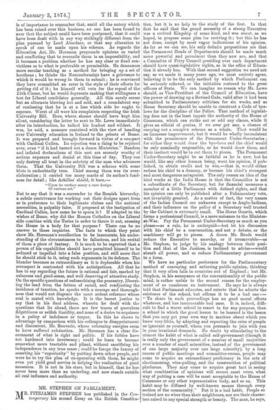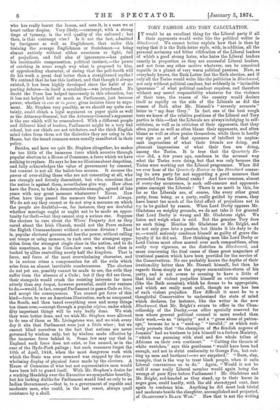MR. STEPHEN ON PARLIAMENT
FITZJAMES STEPHEN has published in the Con- INJ. temporary his second Essay on the British Constitu- tion, but it is no help to the study of the first. In that I first he said that the grand necessity of a strong Executive I was a revived Kingship of some kind, and was about., as we hoped, to propose some plan for reviving it ; but this he has I not done except by most vague indications of his opinion. As far as we can see, his only definite propositions are that the Permanent Heads of Departments should be made much more powerful and prominent than they now are, and that a Committe of Privy Council presiding over each department should have quasi-legislative rights, as in the office of Educa- tion it already has. With that second suggestion we need not say, as we made it many years ago, we most entirely agree, believing it to be the only method by which Parliament can be seriously relieved, or the initiative restored to the great officers of State. We can imagine no reason why Mr. Lowe should, as Vice-President of the Council of Education, have the power of drawing up a Revised Code, valid after it had been submitted to Parliamentary criticism for six weeks, and as Home Secretary should be unable to construct a Code of bye- laws for the discipline of the Police. That method of legislat- ing does not in the least impair the authority of the House of Commons, which can strike out or add any clause, while it gives an official of genius, if we ever get one, a chance of carrying out a complex scheme as a whole. That would be an immense improvement, but it would be wholly inconsistent with the prominence of the Permanent Under-Secretaries ; for either they would draw the bye-laws and the chief would be only nominally responsible, or he would draw them, and their instinct would be to cut them to pieces. The Permanent Under-Secretary might be as faithful as he is now, but he would, like any other human being, want his opinion, if pub- lished, to obtain credit and to win,—that is, would either reduce his chief to a dummy, or become his chief's strongest and most dangerous antagonist. The only reason an idea of the kind works at the India House is that the Councillor is not a subordinate of the Secretary, but for financial measures a member of a little Parliament with defined rights, and that his opinion can only be published after a Paliamentary vote, not invariably granted. As a matter of fact, the very names of the Indian Council are unknown except to Anglo-Indians, and their influence on the policy of a Secretary well trusted by the Cabinet is extremely small. The Horse Guards, which forms a professional Council, is a mere nuisance to the Minister- at-War. Pay the Permanent Under-Secretary as much as you please—as a rule, he is underpaid—but let his discussion with his chief be a conversation, and not a debate, or the machinery will go to pieces. A dozen Mr. Reeds would reduce the Executive to anarchy, or if irremovable—as Mr. Stephen, to judge by his analogy between their posi- tion and that of the Justices, is inclined to advise—would absorb all power, and so reduce Parliamentary government to a form.
We have no particular preference for the Parliamentary method of conveying and enforcing public opinion, thinking that it very often fails in countries out of England ; but Mr. Stephen, in his annoyance at the conventionality of the public mind, is rather unfair to the second reason for the employ- ment of so cumbrous an instrument. He says he is always told that Parliament educates, and retorts that he admits the existence of the school, but affirms it to be a bad one :— " To share in such proceedings has no good moral effeets whatever, and has innumerable bad ones. It is, indeed, diffi- cult to find a worse school to resort to for any purpose, than a school in which the great lesson to be learned is the lesson that you may get your own way in matters about which you know very little, by adopting and repeating the cries of people as ignorant as yourself, whom you persuade to join with you in your irrational demands. No doubt by stimulating to the utmost the habit of what is called self-government (though it is really only the government of a number of small majorities over a number of small minorities, instead of the government of one large majority over one large minority), by a long course of public meetings and committee-rooms, people may come to acquire an extraordinary proficiency in the arts of electioneering, wire-pulling, and the construction of political platforms. They may come to acquire great tact in seeing what combination of opinions will secure most votes, what way of putting a case will be most acceptable to the House of- Commons or any other representative body, and so on. This ,habit may be diffused by well-known means through every ,section of the community." But it is a bad habit. People so trained are no wiser than their neighbours, nor are their charac- ters raised to any special strength or beauty. The man, he says,
who has really learnt the lesson, and uses it, is a man we at heart rather despise. Very likely,—contempt, with a strong tinge of tyranny, is the evil quality of the cultured ; but then, is that contempt wise ? Is it not the fact, admitted by foreigners as well as Englishmen, that under this training the average Englishman or Scotchman—a being almost entirely without either sweetness or light, fall of prejudices, and full also of ignorances—has gained his inestimable compensation, political instinct,—the power of catching in some rough way what is proposed to him, of apprehending character, of seeing that the poll-booth will do his work a great deal better than a straightened scythe ?
We contend that he has this instinct, and that though it always existed, it has been highly developed since the habit of re- porting debates—in itself a revolution—was introduced. No doubt the Press has helped immensely in this education, but it has not helped half so much as Parliament, just because
power, whether in esse or in posse, gives incisive force to argu-
ment. Mr. Stephen very possibly, as we should say quite cer- tainly, could clinch a legal argument on paper quite as well as the Attorney-General, but the Attorney-General's argument is the one which will be remembered. With a different people and different kind of leaders, Parliament might be a very bad school, but our chiefs are not tricksters, and the thick English mind takes from them not the dialectics they are using in the House, but the broad common-sense usually manifested in their policy.
Besides, and here we quit Mr. Stephen altogether, he makes far too little of the immense force which accretes through popular election to a House of Commons, a force which we have nothing to replace. He says he has no illusions about despotism, and fully acknowledges the value of government by consent, but consent is not all the ballot-box secures. It secures the power of over-riding those who are not consenting at all, who are strongly and fiercely dissentient, but who, conscious that the nation is against them, nevertheless give way. How often have the Peers, to take:a demonstrable example, agreed of late years with any great measure whatsoever? Never. How often have they passed the measure they hated Always. We do not say they cannot or do not stop a measure on which the people are doubtful—as, for instance, they are doubtful whether marriage ought or ought not to be made an oppor- tunity for theft—but they cannot stop a serious one. Suppose the electors to care about the Wives' Property Act as they cared about the Irish Church, would not the Peers endorse the Eighth Commandment without a serious division ? That is, popular electoral government has the power, without calling out troops or using menaces, to rash over the strongest oppo- sition from the strongest single class in the nation, and to do this sometimes, as in the Corn-law case, when that class is backed by allies controlling nearly half the kingdom. That is force, and force of the most overwhelming character, and is in serious crises a compensation for all the evils which arise from an almost inevitable cumbrousness. The electors do not yet see, possibly cannot be made to see, the evils they suffer from the absence of a Code ; but if they did see them, their stampede would crush the resisting interests far more utterly than any despot, however powerful, could ever venture
to do,—would, in fact, compel Parliament to pass a Code en bloc,
and accept the consequences. You cannot get force of this kind—force, to use an American illustration, such as conquered the South, and then taxed everything once and many things
ten times over,—except through a popular re'gime, under which fifty important things will be very badly done. We wish
they were better done, and we wish Mr. Stephen were allowed to do one of them as Mr. Livingstone was, and we wish every day it sits that Parliament were just a little wiser ; but we
,cannot blind ourselves to the fact that nations are never
governed by wisdom only, but by wisdom made effective by the immense force behind it. Some few may say that in England such force does not exist, or lies unused, as in the case of the Hyde-Park palings ; but such reasoners forget the 10th of April, 1848, when the most dangerous rash with which the State was ever menaced was stopped by the over- whelming display of physical force made by the electors. A House of Commons of wise but not representative men would have been left to guard itself. With Mr. Stephen's desire for a working Headship over the Executive we sympathise heartily, bat his lurking dislike for Parliament would lead us only to an Indian Government,—that is, to a government of capable and moderate men, who could, in the last resort, always quell resistance by a shell.











































 Previous page
Previous page